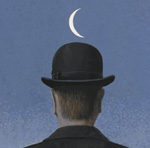
 BEHAVIOR ARTICLES
BEHAVIOR ARTICLES

"Don't copulate with people you don't want to fall in love with, because you may do just that." - Helen Fischer
BETWEEN the "I" that is us and our illness that presumes to establish dominion over the "I" is a battle played out on the field of behavior. Everything is fair game, from our likes and dislikes to how we relate to people to how we experience our surroundings.
In some instances, we need to accept who we are and adapt accordingly. In others, we can give thanks for those parts of us that are true gifts. But first, we need to figure out who we truly are, and that requires rigorous and unflinching self-inquiry. These articles will whet your appetite.
Also - shameless plug, here - check out my new book, IN SEARCH OF OUR IDENTITY ...
The pic to illustrate Behavior is a close-up of Holbein's "Henry VIII." The monarch's defying the Pope and killing off half his serial wives takes care of the seriously disturbed side of the personality equation. His sixteenth century rock star status - he was an accomplished lutenist, singer, organist, and composer, and a generous patron of the arts - captures the creative and positive side. Mind you, Henry's way of resolving personal domestic quarrels can also be regarded as creative.
Often, it's not just bipolar.
Borderline Personality Disorder I
What may look like bipolar is completely different.
Borderline Personality Disorder II
When "normal" fails us.
If we ask the right questions, maybe we can come up with the right answers.
When is depression your true "normal?"
Where personality interacts with mood.
The Idealist and the Highly Sensitive
Do our sensitive natures account for our sense of feeling different?
Outliers Like Us
Don't fit in? Here's one answer.
Not to be confused with hypomania.
Your definitive depression cheat sheet.
No pleasure is a core feature of depression. Then what?
Knowing how to keep cool can help us stay calm.
We may be wildly talented, but there is a catch.
Those thoughts that come out of nowhere - where do they come from?
New brain science discoveries are providing new insights into alternate realities.
Non-linear Thinking
Non-linear may explain more about our thinking than bipolar.
Often, we never see it coming.
Your second-favorite organ may be the key player.









